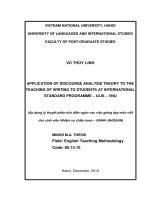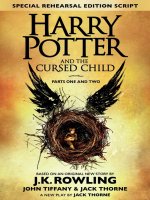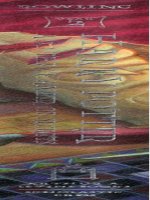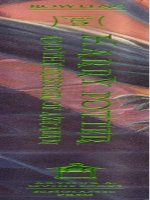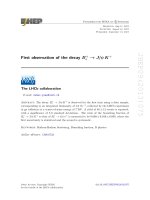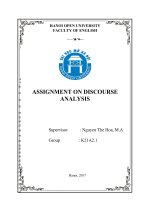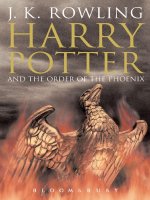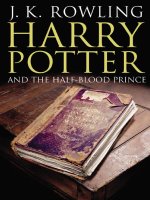Assignment on discourse analysis analytic subject the first chapter ofharry potter and the sorcerers stone (2001), j k rowling
Bạn đang xem bản rút gọn của tài liệu. Xem và tải ngay bản đầy đủ của tài liệu tại đây (895.67 KB, 21 trang )
<span class="text_page_counter">Trang 1</span><div class="page_container" data-page="1">
<b>HANOI OPEN UNIVERSITY</b>
</div><span class="text_page_counter">Trang 3</span><div class="page_container" data-page="3"><b>I. INTRODUCTION</b>
Discourse analysis considers how language, both spoken and written, enacts social and cultural perspectives and identities. Discourse is a focus of study in most of the humanities and social sciences, and discourse analysis is practiced in one way or another by anthropologists, communications scholars, linguists, literary critics, and sociologists, as well as rhetoricians. Discourse analysts set out to answer a variety of questions about language, about writers and speakers, and about sociocultural processes that surround and give rise to discourse, but all approach their tasks by paying close and systematic attention to particular texts and their contexts. We are all familiar with the informal discourse analysis involved in paraphrasing the meanings of written texts and conversations, a skill we learn in writing and literature classes and in daily life.
</div><span class="text_page_counter">Trang 4</span><div class="page_container" data-page="4"><b>II. THE EXTRACT</b>
<b>Harry Potter and the Sorcerer's Stone (Chapter 01)</b>
<b>(</b>J.K.Rowling)Mr. and Mrs. Dursley, of number four, Privet Drive, were proud to say that they were perfectly normal, thank you very much. They were the last people you’d expect to be involved in anything strange or mysterious, because they just didn’t hold with such nonsense. Mr. Dursley was the director of a firm called Grunnings, which made drills. He was a big, beefy man with hardly any neck, although he did have a very large mustache. Mrs. Dursley was thin and blonde and had nearly twice the usual amount of neck, which came in very useful as she spent so much of her time craning over garden fences, spying on the neighbors. The Dursleys had a small son called Dudley and in their opinion there was no finer boy anywhere. The Dursleys had everything they wanted, but they also had a secret, and their greatest fear was that somebody would discover it.
They didn’t think they could bear it if anyone found out about the Potters. Mrs. Potter was Mrs. Dursley’s sister, but they hadn’t met for several years; in fact, Mrs. Dursley pretended she didn’t have a sister, because her sister and her good-for-nothing husband were as unDursleyish as it was possible to be. The Dursleys shuddered to think what the neighbors would say if the Potters arrived in the street. The Dursleys knew that the Potters had a small son, too, but they had never even seen him. This boy was another good reason for keeping the Potters away; they didn’t want Dudley mixing with a child like that.
When Mr. and Mrs. Dursley woke up on the dull, gray Tuesday our story starts, there was nothing about the cloudy sky outside to suggest that strange and mysterious things would soon be happening all over the country. Mr. Dursley hummed as he picked out his most boring tie for work, and Mrs. Dursley gossiped away happily as she wrestled a screaming Dudley into his high chair.
None of them noticed a large, tawny owl flutter past the window.
</div><span class="text_page_counter">Trang 5</span><div class="page_container" data-page="5">At half past eight, Mr. Dursley picked up his briefcase, pecked Mrs. Dursley on the cheek, and tried to kiss Dudley goodbye but missed, because Dudley was now having a tantrum and throwing his cereal at the walls. “Little tyke,” chortled Mr. Dursley as he left the house. He got into his car and backed out of number four’s drive.
It was on the corner of the street that he noticed the first sign of something peculiar — a cat reading a map. For a second, Mr. Dursley didn’t realize what he had seen — then he jerked his head around to look again. There was a tabby cat standing on the corner of Privet Drive, but there wasn’t a map in sight. What could he have been thinking of? It must have been a trick of the light. Mr. Dursley blinked and stared at the cat. It stared back. As Mr. Dursley drove around the corner and up the road, he watched the cat in his mirror. It was now reading the sign that said Privet Drive — no, looking at the sign; cats couldn’t read maps or signs. Mr. Dursley gave himself a little shake and put the cat out of his mind. As he drove toward town he thought of nothing except a large order of drills he was hoping to get that day.
But on the edge of town, drills were driven out of his mind by something else. As he sat in the usual morning traffic jam, he couldn’t help noticing that there seemed to be a lot of strangely dressed people about. People in cloaks. Mr. Dursley couldn’t bear people who dressed in funny clothes — the get-ups you saw on young people! He supposed this was some stupid new fashion. Hedrummed his fingers on the steering wheel and his eyes fell on a huddle of these weirdos standing quite close by. They were whispering excitedly together. Mr. Dursley was enraged to see that a couple of them weren’t young at all; why, that man had to be older than he was, and wearing an emerald-green cloak! The nerve of him! But then it struck Mr. Dursley that this was probably some silly stunt — these people were obviously collecting for something . . . yes, that would be it. The traffic moved on and a few minutes later, Mr. Dursley arrived in the Grunnings parking lot, his mind back on drills.
Mr. Dursley always sat with his back to the window in his office on the ninth floor. If he hadn’t, he might have found it harder to concentrate on drills that morning. He didn’t see the owls swooping past in broad daylight, though people down in the street did; they pointed and gazed open-mouthed as owl after owl sped
</div><span class="text_page_counter">Trang 6</span><div class="page_container" data-page="6">overhead. Most of them had never seen an owl even at nighttime. Mr.Dursley, however, had a perfectly normal, owl-free morning. He yelled at five different people. He made several important telephone calls and shouted a bit more. He was in a very good mood until lunchtime, when he thought he’d stretch his legs and walk across the road to buy himself a bun from the bakery.
He’d forgotten all about the people in cloaks until he passed a group of them next to the baker’s. He eyed them angrily as he passed. He didn’t know why, but they made him uneasy. This bunch were whispering excitedly, too, and he couldn’t see a single collecting tin. It was on his way back past them, clutching a large doughnut in a bag, that he caught a few words of what they were saying. “The Potters, that’s right, that’s what I heard —”
“— yes, their son, Harry —”
Mr. Dursley stopped dead. Fear flooded him. He looked back at the whisperers as if he wanted to say something to them, but thought better of it.
He dashed back across the road, hurried up to his office, snapped at his secretary not to disturb him, seized his telephone, and had almost finished dialing his home number when he changed his mind. He put the receiver back down and stroked his mustache, thinking . . . no, he was being stupid. Potter wasn’t such an unusual name. He was sure there were lots of people called Potter who had a son called Harry. Come to think of it, he wasn’t even sure his nephew was called Harry. He’d never even seen the boy. Itmight have been Harvey. Or Harold. There was no point in worrying Mrs. Dursley; she always got so upset at any mention of hersister. He didn’t blame her — if he’d had a sister like that . . . but all the same, those people in cloaks . . .
He found it a lot harder to concentrate on drills that afternoon and when he left the building at five o’clock, he was still so worried that he walked straight into someone just outside the door.
“Sorry,” he grunted, as the tiny old man stumbled and almost fell. It was a few seconds before Mr. Dursley realized that the man was wearing a violet cloak. He didn’t seem at all upset at being almost knocked to the ground. On the contrary, his face split into a wide smile and he said in a squeaky voice that made passersby
</div><span class="text_page_counter">Trang 7</span><div class="page_container" data-page="7">stare, “Don’t be sorry, my dear sir, for nothing could upset me today! Rejoice, for You-Know-Who has gone at last! Even Muggles like your-self should be celebrating, this happy, happy day!”
And the old man hugged Mr. Dursley around the middle and walked off. Mr. Dursley stood rooted to the spot. He had been hugged by a complete stranger. He also thought he had been called a Muggle, whatever that was. He was rattled. He hurried to his car and set off for home, hoping he was imagining things, which he had never hoped before, because he didn’t approve of imagination.
As he pulled into the driveway of number four, the first thing he saw — and it didn’t improve his mood — was the tabby cat he’d spotted that morning. It was now sitting on his garden wall. He was sure it was the d one; it had the same markings around its eyes.
“Shoo!” said Mr. Dursley loudly.
The cat didn’t move. It just gave him a stern look. Was this normal cat behavior? Mr. Dursley wondered. Trying to pull himself together, he let himself into the house. He was still determined not to mention anything to his wife.
Mrs. Dursley had had a nice, normal day. She told him over dinner all about Mrs. Next Door’s problems with her daughter and how Dudley had learned a new word (“Won’t!”). Mr. Dursley tried to act normally. When Dudley had been put to bed, he went into the living room in time to catch the last report on the evening news:
“And finally, bird-watchers everywhere have reported that the nation’s owls have been behaving very unusually today. Although owls normally hunt at night and are hardly ever seen in daylight, there have been hundreds of sightings of these birds flying in every direction since sunrise. Experts are unable to explain why the owls have suddenly changed their sleeping pattern.” The newscaster allowed himself a grin. “Most mysterious. And now, over to Jim McGuffin with the weather. Going to be any more showers of owls tonight, Jim?”
</div><span class="text_page_counter">Trang 8</span><div class="page_container" data-page="8"><b>III. PROVE THE TEXT IS WRITTEN LANGUAGE</b>
<b>"Harry Potter" is a famous book and film series. The following study</b>
will demonstrate that this is a written text in terms of grammar and lexical density.
The text is divided into 21 pharagraphs, with more complex sentences than simple sentences. There are a lot of modifier in the text, there are more lexical words.
There are no fillers, nor is the same syntaxtic form repeated. There are no refined expressions and only a few colloquial expressions. It uses formal language. There are no missing sentences, and all subjects have major verbs.
All are demonstrated by the folowing aspects:
<b>1. Grammar:</b>
Linguistically, written language tends to consist of clauses that are internally complex, whereas with spoken language the complexity exists in the ways in which clauses are joinedtogether. Here are some of complex grammar structures from the extract:
- Mrs. Dursley was thin and blonde and had nearly twice the usual amount of neck, which came in very useful as she spent so much of her time craning over garden fences, spying on the neighbors. (6-8) - When Mr. and Mrs. Dursley woke up on the dull, gray Tuesday our story starts, there was nothing about the cloudy sky outside to suggest that strange and mysterious things would soon be happening all over the country. (20-22)
</div><span class="text_page_counter">Trang 9</span><div class="page_container" data-page="9">- Mr. Dursley hummed as he picked out his most boring tie for work, and Mrs. Dursley gossiped away happily as she wrestled a screaming Dudley into his high chair. (22-24)
- At half past eight, Mr. Dursley picked up his briefcase, pecked Mrs. Dursley on the cheek, and tried to kiss Dudley goodbye but missed, because Dudley was now having a tantrum and throwing his cereal at the walls. (26-28)
- He didn’t see the owls swooping past in broad daylight, though people down in the street did; they pointed and gazed open-mouthed as owl after owl sped overhead. (57-59)
- He dashed back across the road, hurried up to his office, snapped at his secretary not to disturb him, seized his telephone, and had almost finished dialing his home number when he changed his mind.(73-75)
- As he pulled into the driveway of number four, the first thing he saw — and it didn’t improve his mood — was the tabby cat he’d spotted that morning. (98-99)
<b>-2. Lexicaldensity:</b>
Most sentences in the extract display a much less ratio of content words to total running words.
- The Dursleys shuddered to think what the neighbors would say if the Potters arrived in the street. The Dursleys knew that the Potters had a small son, too, but they had never even seen him. This boy was another good reason for keeping the Potters away; they didn’t want Dudley mixing with a child like that. (15)
</div><span class="text_page_counter">Trang 10</span><div class="page_container" data-page="10">- a trick of the light (24) - gave himself a little shake(28) - knocked to the ground (77) - stood rooted to the spot (83)
</div><span class="text_page_counter">Trang 11</span><div class="page_container" data-page="11"><b>IV. THE COHESIVE IN ENGLISHDISCOURSE</b>
<b>1. GrammaticalCohesion</b>
<b>1.1. Reference:</b>Personal reference
- Both “they” (2) and “they” (3): personal reference, endophoric, anaphoric they => Mr. and Mrs. Dursley (1)
- Both “he” (5): personal reference, endophoric, anaphoric He =>Mr. Dursley (4)
- She (7): personal reference,endophoric, anaphoric She =>Mrs. Dursley (6)
- All “they” (10 and 12): personal reference, endophoric, anaphoric They =>The Dursley (9,10)
- They (13): personal reference, endophoric, anaphoric They => Mrs. Potter and Mrs. Dursley (13) - They (17): personal reference, endophoric, anaphoric
They => Mrs. Potter and Mrs. Dursley (17,18) He (23): personal reference, endophoric, anaphoric He =>Mr. Dursley (22)
- She (24): personal reference,endophoric, cataphoric She =>Mrs. Dursley (23)
- Them (24): personal reference,endophoric, cataphoric Them => Mr. Dursley (22), Mrs. Dursley (23) and Dudley (24) - He (29,31): personal reference, endophoric, anaphoric
</div><span class="text_page_counter">Trang 12</span><div class="page_container" data-page="12">- He (46): personal reference, endophoric, anaphoric
- This (18): demonstrative reference, endophoric, anaphoric This refer to Dudley
- That (19):demonstrative reference, anaphoric.
</div><span class="text_page_counter">Trang 13</span><div class="page_container" data-page="13">That refer to this boy (18)
- These weirdos(47): demonstrative reference, anaphoric. - That man (49): demonstrative reference, anaphoric
- That morning (56,57,99): demonstrative reference, anaphoric - That afternoon (83): demonstrative reference, anaphoric - The people(64): demonstrative reference, exophoric - These people(51): demonstrative reference, anaphoric. - The man (87):demonstrative reference, anaphoric - These birds(113,114): demonstrative reference, anaphoric. - The tiny old man (86):demonstrative reference, anaphoric - The old man (93):demonstrative reference, anaphoric
Comparative reference
- Older (68): comparative reference, endophoric, anaphoric
<b>1.2. Ellipsis:</b>
- Mr. and Mrs. Dursley, of number four, Privet Drive, were proud to say that they were perfectly normal, thank you very much(1)
- He was a big, beefy man with hardly any neck, although he did have a very large mustache. (5,6)
- When Mr. and Mrs. Dursley woke up on the dull, gray Tuesday our story starts, there was nothing about the cloudy sky outside to suggest that strange and mysterious things would soon be happening all over the country (20,21,22)
- None of them noticed a large, tawny owl flutter past the window (25) - At half past eight, Mr. Dursley picked up his briefcase, pecked Mrs. Dursley on the cheek, and tried to kiss Dudley goodbye but missed, because Dudley was now having a tantrum and throwing his cereal at the walls. (26 to 29)
</div>